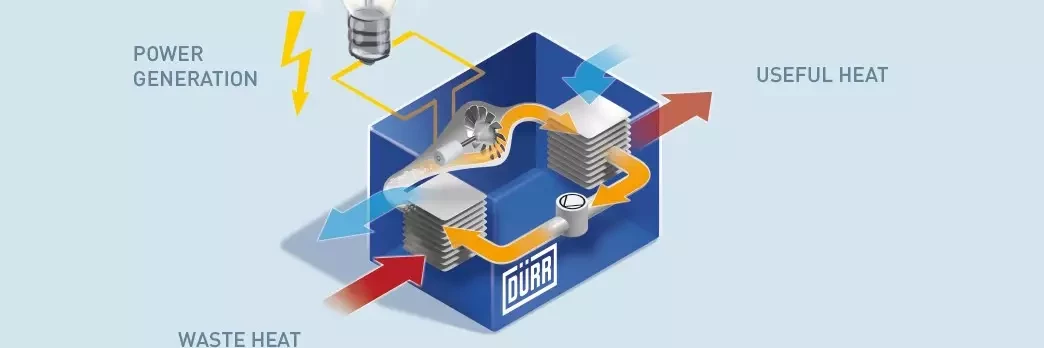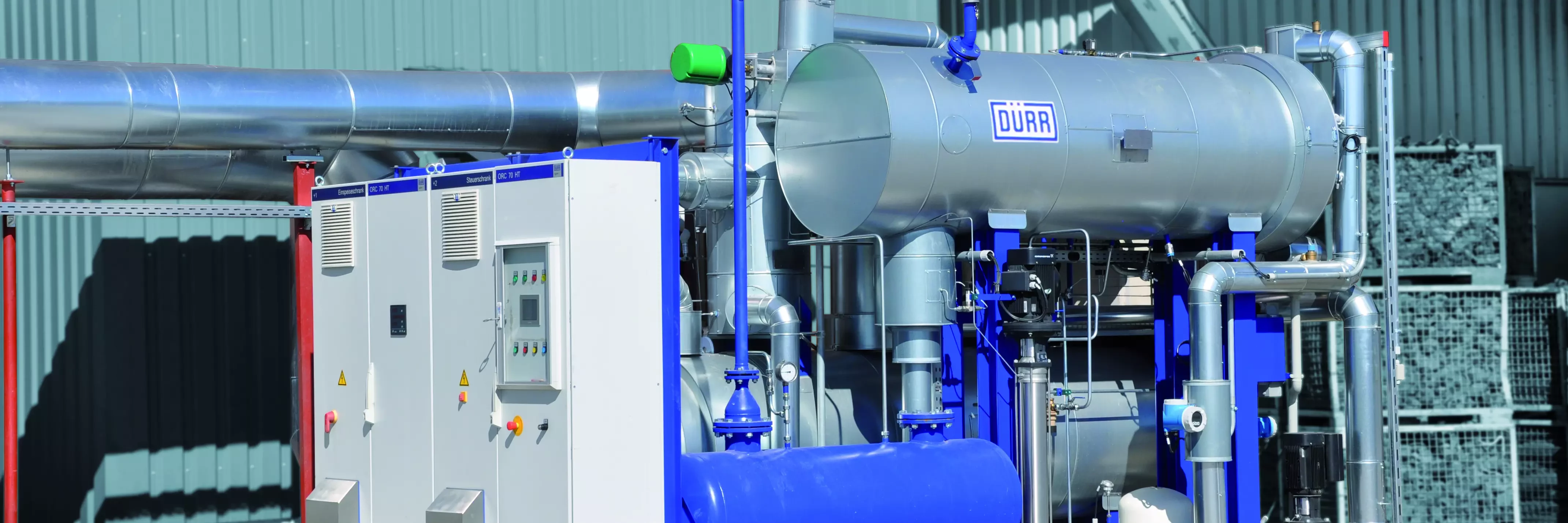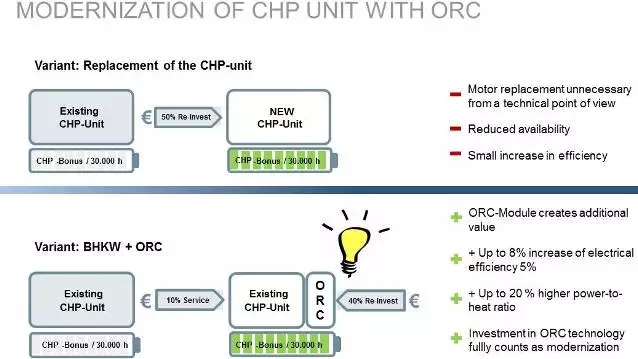- Economic generation of electricity from waste heat
- Improved efficiency and profitability of co-generation units
- Co-generation bonus becomes payable again after ORC retrofit
- Investment in energy infrastructure with high profitability
Many co-generation units work more efficiently after an upgrade. For this reason, the government subsidizes the modernization of existing unit in the frame of the German Co-Generation Act (KWKG). As most important precondition, key components of the unit significantly affecting efficiency must be replaced, and the costs for these measures must amount to at least 50% of the costs for building a new co-generation unit. (For details on the preconditions for receiving subsidies, go to www. Bafa.de>Energie>Kraft-Wärmekopplung).
Owners who opt for the highly efficient ORC technology by Dürr for upgrading their co-generation units can generate more electricity from waste heat that has gone unused before. This significantly increases the degree of electrical efficiency and allows owners the continued operation of written-off co-generation units. Additionally, retrofitting the ORC may make the unit eligible for a second payment of the co-generation bonus, as described in the following.
To upgrade the co-generation unit after it has reached the 30,000 hours limit, the method of choice is usually the installation of a new motor. Often, however, replacing the motor is unnecessary from a technical point of view; furthermore, the relatively long time required for removal and installation negatively affects the availability of the co-generation unit. Most users nevertheless choose to have the motor replaced because this is the easiest way to meet the above-mentioned criterion of a 50% re-investment.
Retrofitting an ORC unit is an alternative that make sense: It uses waste gas heat to generate more electricity. The investment is not used for the replacement of the motor but for an ORC module connected to the unit. The ORC module works like an "electricity-generating heat exchanger". Waste gas heat is used first to generate additional electrical energy and next as thermal heat. Thus, no heat is lost and existing heat consumers can be supplied. Retrofitting an ORC module fulfills the 50% re-investment criterion for the upgrading ratio for co-generation unit. Here, around 40% of the re-investment falls to the ORC module and 10% to the co-generation unit; accordingly, an existing unit will be once more eligible to receive the 30,000 hours co-generation bonus.
Retrofitting an ORC module has several benefits: The ORC module comes pre-assembled as a compact module. Connection to the co-generation unit is fast and easy via waste gas pipes. The operation of the written-off co-generation unit can continue without any changes, no time-consuming motor change takes place.
The upgrade increases the efficiency and thus the power-and-heat ratio of the entire plant by up to 20%. Total electrical efficiency reaches peak values of up to 50%. This means that the entire system works more efficiently, generates additional income from co-generation, and can thus be operated with greater profitability.
Modernization with the help of ORC technology is more economically efficient than a motor replacement: The costs of the ORC module will pay off within a few years because of the earnings from the additionally generated electricity. Furthermore, the existing co-generation system benefits from the renewed payment of the co-generation bonus.
Higher efficiency of the co-generation system with ORC
Retrofitting an ORC module has several advantages: The ORC module increases the efficiency and thus the power-and-heat ratio of the entire plant by up to 20%. Total electrical efficiency reaches peak values of up to 50%. The co-generation bonus becomes payable again without replacement of the motor of the co-generation unit; the operation of written-off units can be continued without any changes.
ORC: Time-proven technology for a variety of applications. Dürr's ORC technology is well-established and available on the market. Today, many units use it for reliable conversion of waste heat to electricity. On principle, the excess heat from low and high temperature sources at levels between 90 °C and 800 °C can be profitably used for generating electricity. ORC systems can be combined with (biomass) firing plants, waste heat from industrial production processes, geothermal or co-generation units using a large variety of fuels. Depending on the temperature level and plant size, up to 10% additional electricity can be generated from the waste heat from the co-generation unit – without additional fuel and emissions.
Functional principle of ORC: Conversion of waste heat to electricity at a relatively low temperature level
The principle of the ORC is comparable to that of a steam engine. Instead of water, the waste heat evaporates an organic working fluid already at relatively low temperatures, driving a generator in a closed circuit. This makes it possible to use heat sources from 90 °C and up for generating electricity.
The compatibility with a variety of different waste heat sources and the wide range of temperatures make ORC a highly flexible technology with many different application options. For tailor-made solutions, Dürr Cyplan provides co-generation-compatible compact modules for output ranges between 40 KWel and 500 KWel. In 2013, Dürr Cyplan 2013 received the Baden-Württemberg Environmental Technology Award and the Sustainable Production Award at the Hanover Fair. Mounted on a base frame for a small footprint, all ORC module types are suitable for flexible use.
Specifically attractive for sewerage plants ORC systems are most effective with waste heat sources available all year round, and with applications with a relatively constant (own) electricity and heat consumption. A typical example are co-generation units in sewerage plants. In a sewage gas co-generation unit with an electrical output of 500 KWel and up, the retrofit of an ORC module can increase the generation of electricity by up 10%, with the corresponding reduction of electricity purchased from the mains supply. The residual heat remaining after the ORC process can be used as process heat for digester tower heating at a temperature level of up to 90 °C. The operators of the sewerage plant are furthermore eligible for payment of a second co-generation bonus. This favorable constellation allows for excellent profitability of the investment and a considerable reduction in the operating costs of the sewerage plant.
Plug-and-play delivery of ORC modules
Simply connect the pre-assembled compact modules via waste gas pipes to the co-generation unit. The operation of the existing co-generation unit continues without any changes and without time-consuming motor replacement; the space requirement is about the same as that of a co-generation unit.
Conclusion: Basically, the ORC technology is suitable for the equipment of new decentralized energy systems, for retrofitting existing and for modernizing old plants. In all cases, the integration of the ORC technology considerably increases the efficiency of the entire systems. For owners of municipal or industrial plants, retrofitting their co-generation unit with an ORC module is a chance for investing sustainably in the existing energy infrastructure while realizing fast increases in efficiency.



